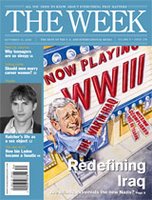Trends: The Economist Effect
The Christian Science Monitor has an interesting article on what it calls the ‘Economist Effect’. Here are some excerpts:
1) Since 1988, Time's circulation has fallen by about 13 percent. US News & World Report has also dropped by about 13 percent. Newsweek, meanwhile, has lost about 6 percent of its paid readership. But during that same time period, other titles have thrived. Take The Economist. The British news weekly has seen its circulation jump by about 300 percent, despite the fact that it is less flashy, more serious, and costs more than twice as much as its US counterparts.  And since its launch in 2001, The Week*, a new kind of Reader's-Digest-type summary of news accounts from other organizations, has attracted 439,000 readers.
And since its launch in 2001, The Week*, a new kind of Reader's-Digest-type summary of news accounts from other organizations, has attracted 439,000 readers.
2) Time's new publishing schedule will mean it hits the streets on the same day as its British competitor. And Time's idea about circulation, placing less emphasis on quantity, suggests an approach that several publications, including The Economist, have pursued: It's not how many subscribers you have; it's who they are.
3) Among newspapers, the rise of the elite media (media that target better educated, more-affluent audiences with more money to spend) can be seen in the growing and increasingly nationalized circulations of The New York Times and The Wall Street Journal. On radio, it can be calculated in the increase of National Public Radio's audience. In magazines, the prime example is The Economist.
4) As wealthier, more news-focused audiences leave mainstream outlets, those outlets will be forced to reach out to different groups to fill the holes in their audience - groups that probably have lighter definitions of news. In other words, a small group of coverage-rich news media will get richer while the rest get poorer in their content.
For complete article, read: The Economist effect: Not all news media are dumbing it down
* Not The Week, brought out by Malayalam Manorama Group
Labels: Trends



0 Comments:
Post a Comment
<< Home